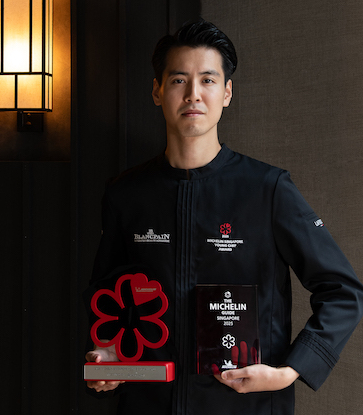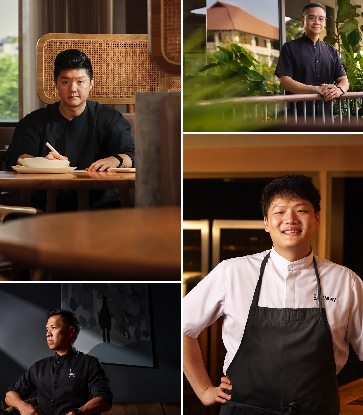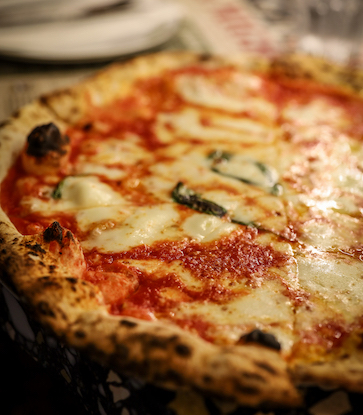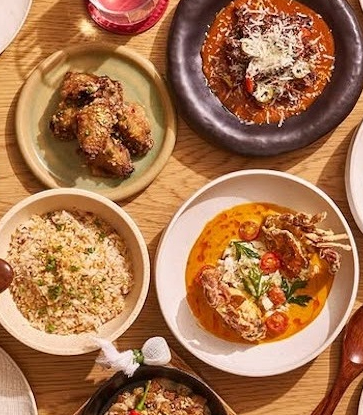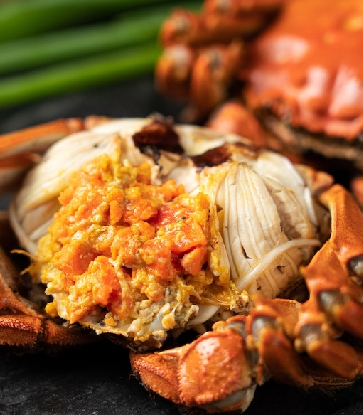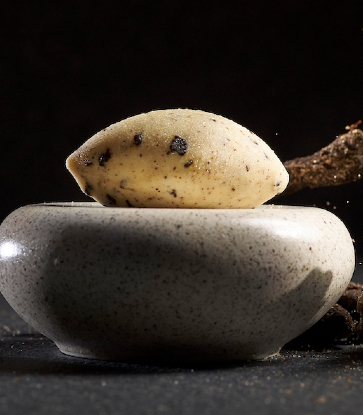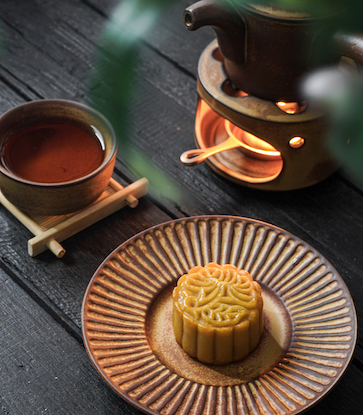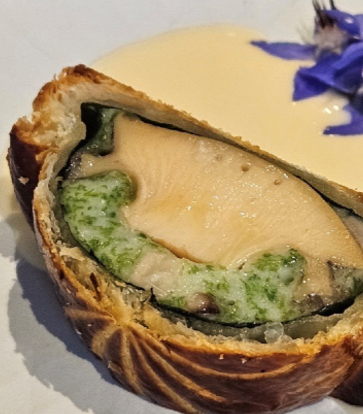
“Chef Ferran Adrià is a mentor in terms of shaping my perception of what food can achieve. He is someone who dares to break expectations of what food can be, by being inventive and taking risks. He is unafraid to explore the seemingly infinite avenues on where quality ingredients can go. Ferran taught me that, with rigour, there are no real boundaries to our expression as chefs. Our talent lies in our tradition, our taste buds, and our ability to translate these heartful lessons from our childhood and past into every dish we serve.
“elBulli has formed the foundation of how I approach my food today. My culinary style and perspectives on food are heavily influenced by the meticulous attention to details restaurants like elBulli demanded, the precision of molecular gastronomy and playing with textures while remaining approachable and unpretentious. I also learnt that no matter what style of cuisine, great food always begins with high-quality ingredients.
“One of the many anecdotes of Ferran that I remember was a meal that we had after we conducted a technical demonstration in Munich. A prominent German publisher and elBulli regular whisked us away in his car. We had no idea where he was taking us until we reached the doors of a historic and prestigious restaurant in the city. The entire restaurant team was waiting in a line to greet us. Upon entering the restaurant, the space was completely empty, and we realised that the restaurant had been opened exclusively for us.
“We had a fabulous menu before leaving for the airport, but once we got on the plane, I’ll never forget what Ferran said to me: ‘Never forget this experience because I would never open my restaurant exclusively for anyone.’
“This was a memorable lesson in my career, because Ferran is one of the most important cooks in gastronomy history. For him to acknowledge and recognise that all clients are equally important and that no one deserves preferential treatment is a learning I hold to heart and the reason why I want my restaurant to be a place that welcomes everyone like family with open arms.”
“We had a fabulous menu before leaving for the airport, but once we got on the plane, I’ll never forget what Ferran said to me: Never forget this experience because I would never open my restaurant exclusively for anyone.”

Ivan Brehm And Mentor Heston Blumenthal
Ivan Brehm is the chef-owner of one-MICHELIN-starred Nouri and has also helmed Bacchanalia till 2016. Prior to relocating to Singapore, he spent five years in three-MICHELIN-starred The Fat Duck by the renowned chef Heston Blumenthal till 2012. Starting out as a stagier, while juggling a full-time job at Hibiscus in London, Brehm worked his way up till to the position of the development chef of The Fat Duck Experimental Kitchen.
“Heston has created a deep impact on the way that I work and understand food. Working in The Lab at The Fat Duck was an empowering experience of unparalleled quest for knowledge and creative expression.
“Every one of my interactions with Heston has left an imprint, but travelling with him to Gastronomika in San Sebastian showed me a side of him that I did not know at work. He was so humble and approachable, and made an effort to connect with people who approached him. We would walk on the streets of San Sebastian and routinely be late for meetings or dinners because he would chat with everyone who showed interest. And when you are Heston, everyone shows interest.
“I’ve worked for brilliant chefs in my career, but something I’ll always cherish was knowing that Heston’s genius and talent never separated him from people. On the contrary, his work always helped to connect and bring joy to people.
“Heston’s presence was felt at The Fat Duck on a daily basis, with or without him. The restaurant was ultimately the product of a man’s mind and his ability to align a great deal of talent in the pursuit of a shared vision. You wanted to do better and be better, because you felt in him a similar energy and approach to the work.
“The biggest lesson that I’ve learnt from Heston was the realisation that every action matters at work and in life. One cannot pick and choose where to apply oneself — to be wonderful on the stove, but to forget to greet your colleagues in the morning, and to have creativity, but miss the fingerprint on the plate.
“This knowledge is hardwired in the heads of all ‘“Ducklings’” at The Fat Duck whom I’ve met. Whether you are making a cheese toastie at home, hiring a new collaborator, or giving directions to a passer-by, the discipline of being thorough and detailed has changed my life.
“Having worked with so many like-minded, committed people working with the sole purpose of making delicious experiences to guests in The Fat Duck showed me that when food and drink are approached with that level of detail, context and purpose, they can be much more than tasty. You learn a new vocabulary, you construct better sentences as a chef, tell better stories, make better dishes and these dishes in turn impact people in meaningful ways.”
“I’ve worked for brilliant chefs in my career, but something I’ll always cherish was knowing that Heston’s genius and talent never separated him from people. On the contrary, his work always helped to connect and bring joy to people.”

Cheung Siu Kong And Mentor Fok Kai Yee
Armed with more than 30 years of culinary experience, Cheung Siu Kong is the Chinese executive chef of one-Michelin-starred Cantonese restaurant Summer Pavilion in The Ritz-Carlton, Millenia Singapore. In 1987, he joined the renowned Lei Garden Restaurant chain in Hong Kong where he honed his skills in crafting delicate dim sum and authentic Cantonese cuisine. In 1996, he moved to Singapore and worked for the Lei Garden outposts here before joining Summer Pavilion in 2003. At Summer Pavilion, he worked with chef Fok Kai Yee, who was the restaurant’s Chinese executive chef till 2014.
“I first met chef Fok when I was a sous chef as part of the opening team for a Lei Garden outlet in Wan Chai in 1996. Back then, he was the chef in-charge of training the kitchen team. Later that year, chef Fok gave me the opportunity to work in Lei Garden’s outlets in Singapore, as he was supervising chef of the Lei Garden outlets here.
“One of chef Fok’s assistants told me that I would not last more than a month given his strict standards. However, I ended up working with him for more than 10 years.
“One of chef Fok’s pet phrases in the kitchen is ‘Do not succumb to the human nature of being lazy’. He is rigorous and has high expectations for the quality of food and service. One of my deepest memories is of him casting a strict eye on the food. He places a high level of conscientiousness into cooking. One needs to consider the four tenets of cooking in Cantonese cooking — the control of the fire, oil, seasoning and viscosity (for sauces). He would not show us a dish’s recipe or tell us how it is cooked directly, but he expected us to experiment and perfect the recipes on our own. He always had an eye for the small details. It was only through trying that we can experience it for ourselves and perfect our dishes.
“Take the classic Cantonese dish of fried rice: the right amount of fire and deft wok action is required to coax out the wok hei (wok’s breath) from the dish. If the fire is too small, the aroma from the wok wouldn’t be apparent; if the fire is too large, the rice grains will get burnt. These days, I also apply the mantra of paying attention to the small details. For example, for the presentation of one of Summer Pavilion’s signature dishes, poached rice with lobster, I pour the lobster broth slowly into the bowl of rice to showcase the rich aroma of the broth, instead of merely presenting the dish on the table.
“Following the same style of chef Fok, I will get two of my staff to cook the same dish and let my staff try the two versions and get them to share their thoughts on why each version turned out differently. Then, I will also share and explain to them the differences between how these two dishes turn out.
“Though chef Fok has never praised me, he has played a vital part in grooming and shaping the chef that I am today.”
READ ALSO: Top Chefs Reveal Spots For Comfort Food

Rishi Naleendra And Mentors Tetsuya Wakuda And Tony Twitchett
The Sri Lanka-born Rishi Naleendra, who converted the one-MICHELIN-starred Cheek By Jowl into Cheek Bistro in April and will be opening a modern Australian fine-dining restaurant later this year, started his fine-dining career in the iconic Taxi Dining Room in Melbourne. He worked under executive chef Tony Twitchett and head chef Glen Byrnes for two years. Later, he honed his craft at Tetsuya’s in Sydney by acclaimed chef Tetsuya Wakuda, who also runs the two-MICHELIN-starred Waku Ghin in Singapore. At Tetsuya’s, Naleendra progressed from chef de partie to sous chef in 2013. He also worked as a pastry chef in Yellow, which is under the Brent Savage group in Sydney.
“Before joining Taxi Dining Room, I worked in many pubs and cafes around Melbourne and this job was my gateway into the fine-dining world. It was here where I learnt most of my basic skills and cultivated my culinary culture. This was the most important job in my career as it gave me the opportunity to work with ingredients that I had never seen before and a better understanding of how restaurants functioned. These days, I still apply all the basic skills I acquired from my time at Taxi Dining Room. For example, the Chicken Liver Parfait, which is served at Cheek Bistro, was one of the first things I learnt at Taxi Dining Room.
“At Tetsuya’s, I truly learnt what long hours in the kitchen were — the discipline required and what it takes to succeed in this environment. The virtue of discipline that I learnt from chef Tetsuya Wakuda is still applied in all of my kitchens today, where pastry knowledge and creativity have been one of the strongest elements in my kitchen.”
Interviews by Kenneth Goh




